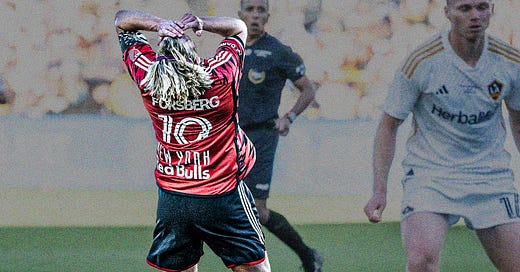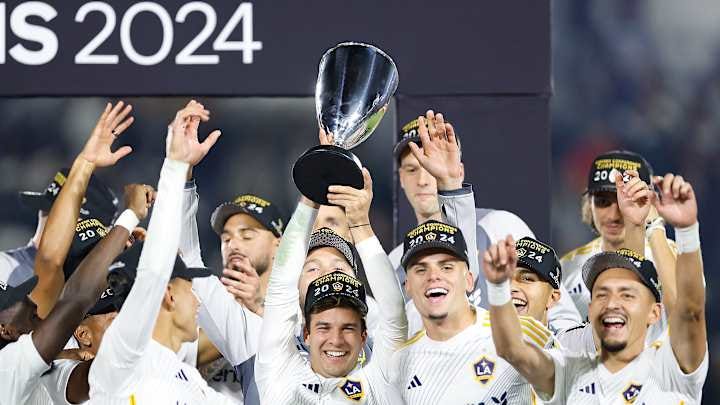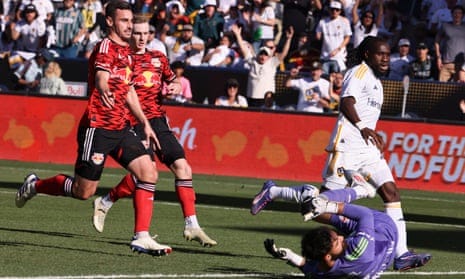The LA Galaxy lifted their sixth MLS Cup on Sunday night in Carson, California, while the New York Red Bulls trudged off the pitch, their shoulders slumped and faces vacant. I can’t count how many times I’ve seen this story unfold, and I’ve lost track of the ways it’s broken my heart. The Red Bulls, so often the bridesmaid in American soccer, stood on the edge of glory again, only to watch it slip away like sand through their fingers.
It wasn’t supposed to be like this.
This time, there was no Zlatan-esque superstar to slay us, no marquee name stealing the spotlight. The Galaxy didn’t even have their best player, Riqui Puig, available to pull the strings. Instead, Puig was up in a suite, dressed in a tailored suit with his Galaxy jersey draped backwards across his shoulders—a symbol of how the night might have been different. But really, wasn’t this always going to happen?
A goal in the opening minutes, another before we’d had time to blink, and the dream of a first MLS Cup was hanging by the thinnest of threads. This team, this club—my club—can’t ever seem to catch a break in the big moments.
Two goals in 13 minutes. Thirteen.
The Red Bulls didn’t know what hit them, and you could see it in their body language. Emil Forsberg, the man brought in to change the culture, to add European quality to the brand, didn’t touch the ball before the second goal went in. Imagine traveling thousands of miles across the Atlantic, being hailed as a savior, only to spend the first half hour of an MLS Cup final watching your opponent carve through your team like butter.
Forsberg’s words from earlier in the week rang hollow as the cameras panned to him, sweat-drenched and frustrated. “I came here to bring Red Bulls back to something special.” You could tell he believed it when he said it. That makes it hurt even more.
When Sean Nealis stabbed home from a corner to pull us within a goal in the 28th minute, I felt hope flicker again—a dangerous thing for a Red Bulls fan. It’s that sliver of possibility that keeps you glued to your seat, cheering, pleading, believing. We’ve been here before, haven’t we? So many close calls. The Supporters’ Shields that felt like half-measures. The playoff collapses.
But this time it was different, we told ourselves. Forsberg had given us something to dream about. Our back line, with Nealis at the center, had been quietly sturdy all year. And under Sandro Schwarz, this team had a bit more grit—fighting through the playoffs to earn their shot at the Galaxy.
Still, when that second-half whistle blew, it was hard to ignore the familiar dread creeping in. The goal scorers didn’t care that the Red Bulls had been more composed after the nightmare start. They didn’t care that Forsberg and Lewis Morgan had begun to weave little triangles of possession. They didn’t care that Carlos Coronel, in goal, had stood on his head to keep us alive.
Galaxy didn’t need the ball to beat us.
Greg Vanney, the Galaxy’s architect, came prepared. If Vanney’s plan without Puig was to absorb pressure and pounce when we made mistakes, it worked to perfection. Delgado, Cerrillo, Brugman—none of them are superstars. None of them will ever be written into Galaxy lore like Beckham or Keane. But they made us pay. Hard.
Painstil’s goal, a clever finish after Brugman’s incisive assist, felt like a gut punch because it was so simple. The second? Even worse. A long pass to Joveljic. A lazy transition. An uninspired defensive effort. And then the ball was in the back of the net. Joveljic’s double somersault—a callback to the Galaxy’s glory years—was the dagger.
And so the Red Bulls find themselves here again, forced to ask the same questions as ever.
What do we stand for?
Red Bull as a global entity has never wavered in its branding. They want fast, pressing soccer, high energy, high risk. It’s their philosophy, stamped on their teams in Germany, Austria, and Brazil. But here in MLS, the Red Bulls’ identity has always felt a little like a costume that doesn’t quite fit. Too reliant on homegrown kids who burn bright for a season before being sold. Too hesitant to add true, game-changing talent.
Forsberg, for all his quality, can’t do it alone. He needs a partner. He needs a striker. Schwarz needs more tools in his box if this team is to evolve beyond being a side that “works hard” and “grinds out results.” You don’t win MLS Cups with effort alone.
We can debate how far we’ve come. After all, this team reached a final, and that’s something. Forsberg joined in mid-season. Schwarz took over only this year. But history doesn’t write itself in moral victories.
Meanwhile, the Galaxy celebrate.
The image of Riqui Puig, jersey backwards, leaping into the arms of his teammates at the final whistle, is one I won’t soon forget. It feels personal, even though it isn’t. The Galaxy have struggled for a decade, but they’ve always believed they were meant to win. Their history tells them that, and now so does their present. Two goals in 13 minutes. They set the tone and never looked back.
Vanney deserves credit for that. For stabilizing a team that was teetering not so long ago, for making the right signings, for trusting his players even without his most important piece on the field. The Galaxy’s comeback story is what every Red Bulls fan dreams about. But dreams are just that, aren’t they?
At what point do we stop believing this is just bad luck?
The questions will linger into the offseason. Forsberg needs support. Schwarz needs backing. The ownership group needs to decide whether New York Red Bulls will remain a “project” team forever or become a club that invests like champions.
Galaxy have six MLS Cups. New York Red Bulls have zero. Zero.
If you’re a longtime Red Bulls fan, you know what that number feels like. You can hear it in your head, the echoes of old failures merging with new ones. You see it in the faces of fans who made the trip to Carson only to watch, helpless, as another chance disappeared into the California night.
At some point, I’ll move on. I’ll tell myself it’s just a game. I’ll remember the joy of the season—the comeback wins, the playoff run, the glimpses of what might still be.
But tonight, I’ll just sit with it. With the frustration and the sadness and the feeling that this was supposed to be our moment.
It wasn’t.
Again.










Tough loss but great match and even with the “goal scoring” deficiency Emil was in position to score the tying goal but it went wide. The Gaxaly went into a defensive shell after the second goal and Red Bulls played themselves back into the match. Gutted but happy the match was so entertaining
So sorry, Jake. Been there with my teams. It was a great game and, to be fair, the Red Bulls really didn't have any business being there. Be proud of how far they got.